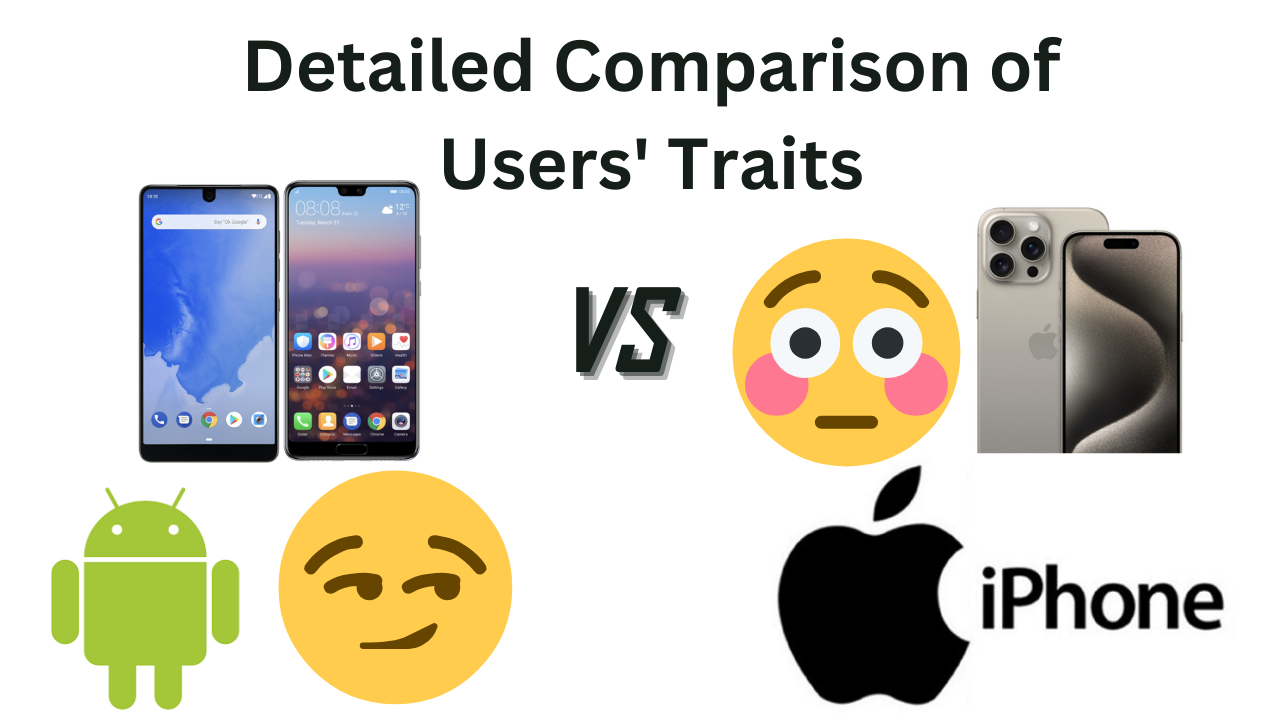The Android vs. iPhone debate isn’t just about operating systems; it’s a reflection of diverse user personalities and preferences. Let’s explore this rivalry in greater depth, examining economic status, personality traits, and behaviors.
Economic and Social Status
Android Users:
- Economic Diversity: Android users come from a wide range of economic backgrounds. The availability of devices from budget to high-end models makes Android accessible to everyone.
- Middle Class and Budget-Conscious: Many Android users are middle-class individuals or those who prioritize getting the most value for their money.
- Tech Enthusiasts: Some Android users are affluent tech enthusiasts who appreciate the advanced features of premium Android models.
iPhone Users:
- Affluent and Brand-Conscious: iPhone users are often perceived as more affluent and brand-conscious, willing to pay a premium for the latest model.
- Status Symbol: Owning an iPhone is sometimes seen as a status symbol, indicating a certain level of economic success.
- Youth and Professionals: Many young professionals and teenagers favor iPhones for their sleek design and social cachet.
Personality Traits and Behaviors
Android Users:
- Realistic and Practical: Often seen as more pragmatic, Android users value functionality and practical features over brand prestige.
- Tech-Savvy: With a knack for customization and tinkering, Android users enjoy exploring and maximizing their device’s potential.
- Independent and Diverse: Reflecting the diversity of the Android ecosystem, users tend to be more independent and open to variety.
- Frugal and Value-Oriented: Many Android users are budget-conscious, seeking the best balance between cost and performance.
iPhone Users:
- Brand Loyalty and Prestige: Strong brand loyalty and a preference for premium products define many iPhone users.
- Show-Off and Trendy: The latest iPhone model often becomes a fashion statement, with users keen to show off their new devices.
- Security and Simplicity: Prioritizing security and ease of use, iPhone users prefer a seamless and secure experience over extensive customization.
- Innovative and Trendsetters: Often seen as trendsetters, iPhone users appreciate the innovative features and polished design of Apple products.
Good Points and Bad Points
Android:
- Good Points:
- Customization: Extensive customization options appeal to those who love personalizing their devices.
- Affordability: Wide range of devices at various price points, making it accessible to a broad audience.
- Google Integration: Seamless integration with Google’s ecosystem and services.
- Bad Points:
- Fragmentation: Inconsistent software updates across different devices can lead to security issues.
- Bloatware: Pre-installed apps that are often unnecessary and can’t be removed easily.
- App Quality Control: Open nature of the Play Store can result in a higher presence of low-quality or malicious apps.
iPhone:
- Good Points:
- User Experience: Consistent and polished user experience with a focus on simplicity.
- Security: Strong emphasis on security and privacy, with regular updates and a controlled app ecosystem.
- Brand Prestige: Owning an iPhone is often associated with status and prestige.
- Bad Points:
- High Cost: Premium pricing makes iPhones less accessible to budget-conscious consumers.
- Limited Customization: Less flexibility in terms of customization compared to Android.
- Proprietary Ecosystem: Dependence on proprietary accessories and services, which can be costly.
Conclusion
The choice between Android and iPhone often reflects deeper personal and economic preferences. Android’s flexibility, affordability, and broad device range attract a diverse and practical user base. iPhone’s simplicity, security, and brand prestige appeal to those who value a premium, seamless experience.
Both platforms have their strengths and weaknesses, catering to different segments of the market. The ongoing competition between Android and iPhone continues to drive innovation, benefiting users across the board.
Ultimately, whether you’re an Android aficionado or an iPhone enthusiast, the most important factor is finding the device that best fits your lifestyle and needs.



